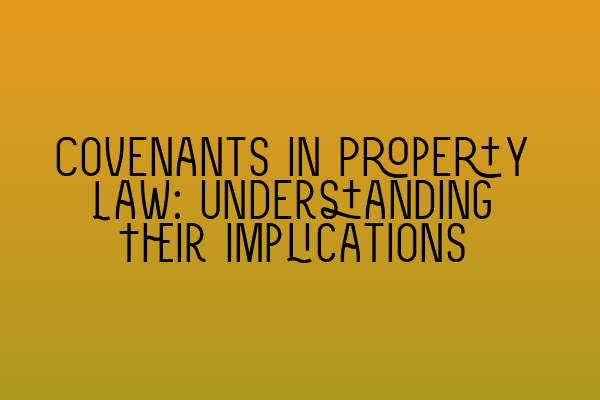Covenants in Property Law: Understanding Their Implications
Welcome to the SQE Property Law Blog! In this article, we will be diving into the complex world of covenants in property law. Whether you’re a first-time buyer or an experienced investor, understanding the implications of covenants is crucial to protect your rights and make informed decisions. So, let’s get started!
Before we delve into the intricacies of covenants, it’s essential to define what a covenant is in the context of property law. A covenant is a legally binding agreement between parties that imposes certain rights and obligations on the property. These agreements are typically found in deeds, leases, or other property documents, and they play a significant role in shaping the use and enjoyment of the property.
Now that we have established what a covenant is, let’s discuss the different types of covenants and their implications.
1. Restrictive Covenants:
Restrictive covenants impose limitations on how a property can be used or developed. These limitations are put in place to maintain the overall value and character of the area. Examples of restrictive covenants include restrictions on building height, architectural design, or even the prohibition of certain activities such as running a business from the property.
Understanding the scope and enforceability of restrictive covenants is crucial when buying or selling a property. It is essential to conduct thorough due diligence to ensure you are aware of any existing restrictions that may impact your plans for the property. Our article on Misrepresentation in Contracts: Unveiling Deceptive Practices provides valuable insights into conducting due diligence and avoiding misrepresentation.
2. Positive Covenants:
Positive covenants require the property owner to actively do something or contribute towards a certain endeavor. For example, a positive covenant may require the property owner to contribute towards the maintenance of common areas in a housing development or to pay into a sinking fund for repairs and upkeep.
It’s important to be aware of positive covenants when purchasing a property, as they can involve ongoing financial commitments and responsibilities. Ensuring you understand the extent and nature of these obligations will help you make informed decisions. For more information on positive covenants, we recommend reading our article on Understanding Contractual Capacity: Rights and Limitations.
3. Freehold Covenants:
Freehold covenants are agreements between two freehold property owners and bind successive owners of the properties. These covenants continue to be enforceable even if the original parties to the covenant no longer own the properties.
Understanding the enforceability of freehold covenants is crucial, as they can have long-term implications for the use and development of your property. Our article on SQE Contract Law: Analyzing Landmark Cases and Influential Judicial Decisions examines influential judicial decisions related to property law and offers valuable insights into the enforcement of freehold covenants.
4. Leasehold Covenants:
Leasehold covenants are agreements between the landlord and tenant of a property. These covenants govern both the rights and obligations of the landlord and tenant throughout the duration of the lease agreement.
When entering into a lease agreement, it’s crucial to have a clear understanding of the leasehold covenants to avoid any potential conflicts or breaches of contract. Our article on A Closer Look at SQE Contract Law Syllabus provides an in-depth exploration of the SQE syllabus for contract law and can give you a comprehensive understanding of leasehold covenants.
With the diverse range of covenants in property law, seeking expert legal advice when dealing with any property transaction is highly recommended. An experienced solicitor can guide you through the complexities and ensure your rights are protected.
At SQE Property Law & Land Law, we have a team of skilled solicitors who specialize in property law. Our expertise allows us to provide tailored solutions to meet your specific needs. Whether you are buying, selling, or leasing a property, our team is here to assist you every step of the way.
To test your knowledge on contract law, including property law covenants, we invite you to try our interactive SQE Mock Tests for Contract Law: Test Your Knowledge.
We hope this article has shed some light on the implications of covenants in property law. By understanding the different types of covenants and their consequences, you can make informed decisions when navigating the complex world of property transactions. For expert legal advice and assistance, contact SQE Property Law & Land Law today.
Sources:
– Misrepresentation in Contracts: Unveiling Deceptive Practices
– A Closer Look at SQE Contract Law Syllabus
– SQE Contract Law: Analyzing Landmark Cases and Influential Judicial Decisions
– Understanding Contractual Capacity: Rights and Limitations
– Interactive SQE Mock Tests for Contract Law: Test Your Knowledge
